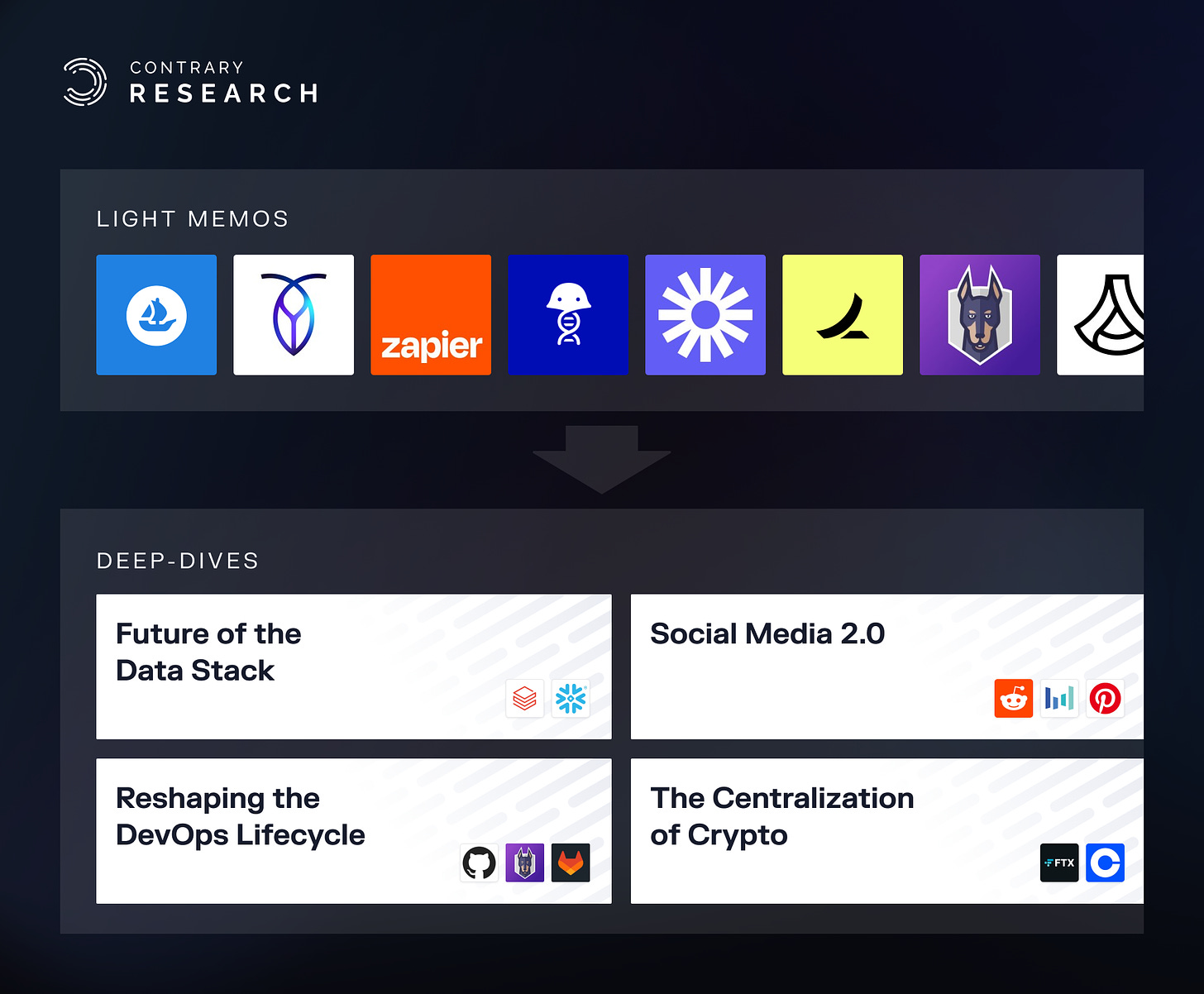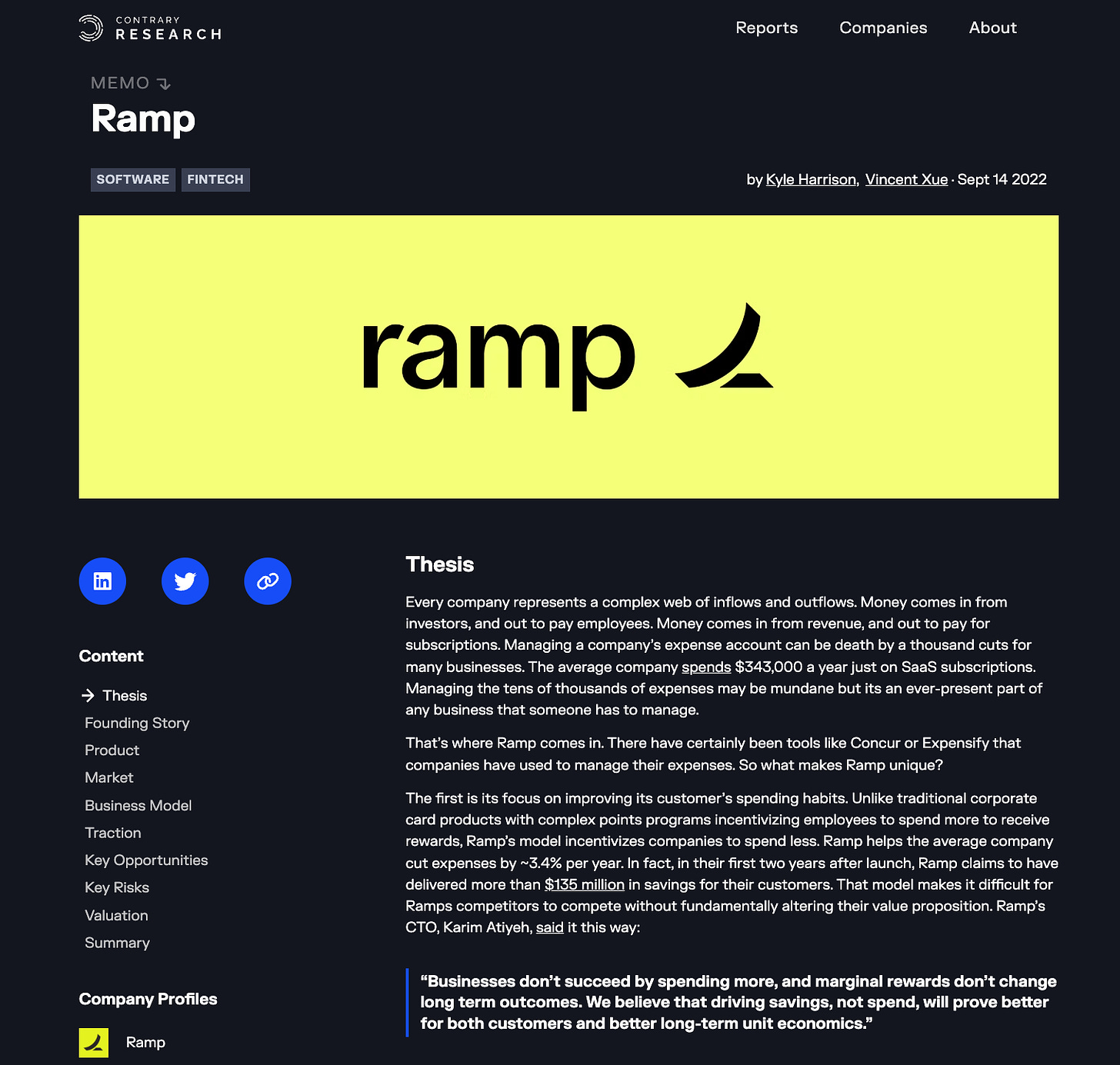This is a weekly newsletter about the art and science of building and investing in tech companies. To receive Investing 101 in your inbox each week, subscribe here:
Books are dead.
But before the literary journals, and bookstore economists jump up and down, I'm not talking about the decline in reading or the explosion of e-books.
Books are dead from day one. A few years ago I picked up a book called, The Elements of Journalism. This was just after the 2016 election, and the popularization of "Fake News." After I got a few chapters in I realized the book was written in 2001, and I was shocked with how much of it was mostly irrelevant. The book was, effectively, dead.
The world is a complex interconnected graph of all the things people know, and all the things people do as a result of what they know. Those ideas are constantly evolving, and any attempt to capture them is ridiculously difficult. Especially in internet time.
Content decays as ideas progress. Books don't change (and they're not great at conveying information in the first place). Bad information can stay online for years. One of the mistakes we make is believing that information is meant to be established and authoritative. Outside of a highly select set of "eternal truths," most ideas are meant to be fluid.
I've written before about a "spirit of humility" that investors ought to have. More people should be willing to change their minds. More people should treat their ideas like software that is open source, and in active development. Instead, people treat their ideas like a bridge; stable, but slowly decaying.
The idea of "open source knowledge" came from reading the book Working in Public by Nadia Eghbal Asparouhova. She masterfully covers the evolution of open source software, but so often she also drew parallels to other types of creative endeavors, like content, that I couldn't help but think about the implications for the knowledge we all have and share:
"Software, once written, is never really finished. It might be feature-complete, but, in order to continue running, software almost always requires some sort of ongoing maintenance... The rules of the “information economy,” like patents and licenses, lend themselves well to commoditized content, but when content is a living organism its value is better measured in terms of people and relationships."
Open-source knowledge has become one of my biggest portfolio ideas where I collect it in tags, articles, and books. This week I announced a project that has let me think even more about this concept, so I thought I would (1) share that project with you, and the thinking behind it, and then (2) use that to illustrate what exactly I mean by "open-source knowledge."
Introducing Contrary Research
At Contrary, we're laser focused on identifying the sharpest people in the world, and supporting them relentlessly throughout their life and careers. We support a community of over 400 talented engineers, operators, founders, and future-founders.
Sharp people want to tackle hard problems, and often the solutions to those problems result in building a company. Each company has a story. And while the people are a critical part, there is also the technology, and the market, and the competitors.
Contrary Research is a way for us to better help tell those stories. We build on a foundation of what we call light memos; brief introductions to a wide variety of private tech companies. We then use those introductions as a foundation to go deeper. We find where the stories of these companies converge, and dive in.
Learning about, and understanding, private companies is difficult. There's no one source of information that will give you the entire picture. Our goal in launching Contrary Research has a few components:
Do the hard work of bringing that information together
Build an engine that can continue to tell those stories as they evolve
Identify areas to go deeper where the whole story is greater than just the sum of the parts (i.e. where can we add valuable perspective?)
Just like Nadia mentioned; "when content is a living organism its value is better measured in terms of people and relationships." Our goal is to create a living organism. Contrary is already very good at finding the best people. But to create a living organism, we're also focusing on the relationships between companies, and relationships with the best people who can help us articulate these stories.
So what does Contrary Research have to do with open-source knowledge?
What is Open-Source Knowledge?
In open-source software there are three big ideas that stuck out to me as worth learning from:
The power of contributors
The feedback loop of a community
The interconnectivity of ideas
Contributors
In Working in Public, Nadia points out the 80/20 rule of open-source contributions:
"One study found that in more than 85% of the open source projects the researchers examined on GitHub, less than 5% of developers were responsible for over 95% of code and social interactions."
Every discipline has their own "5%" of contributors; the people who become a center of gravity around a particular set of ideas. Dan McMurtrie described this idea to me as "the rivers and streams of different markets."
"We use Twitter to identify what networks exist and how are they connected. Usually there is a community around different topics. But people misunderstand the main river as the only river. There is a ton of talent that is under-appreciated because they swim in less prominent [idea] pools."
Open-source knowledge revolves around this idea where different people are going deep on different areas. That expertise can come from academic training, like working at Oxford as the foremost expert on J.R.R. Tolkien. But more and more it is coming from content creators building online notoriety.
Catherine Yeo writes about the struggle creators face in trying to build online notability in a world with outdated ways of finding the most qualified perspectives:
"Through their content, they grow their audience and impact, to the point that 92% of consumers trust an influencer’s product recommendation more than a celebrity endorsement. But notability, as its own notion, is inherently subjective."
Ultimately, whether knowledge specialists (i.e. contributors) hold sway depends on how broadly they are listened to. That subjectivity makes widespread adoption more difficult, but not impossible. There have always been people dedicating their whole lives to esoteric fields, but the internet has made them much more accessible. The internet also made it easier for communities to form around these idea centers (or repos).
Community Feedback Loops
There are already mechanisms for building communities around knowledge and ideas. Another one of my portfolio ideas fits in here: building cities. In the book, "Walt Disney and the Promise of Progress City," you see this insight:
“One of the primary purposes for a city is to bring together many people so that, through direct communication with each other, they may exchange goods and ideas without undue loss of energy and time.”
Whether it’s cities, universities, research labs, Juntos, or book clubs—people love to congregate around shared ideas and projects. Companies that are built on open-source software specifically point to the power of their community as a competitive differentiation. That's because they understand the value of that feedback loop.
The world has an information engine. If you can find the right "streams," or the right community, you can improve your own thinking by exposing your ideas to that specialized engine (regardless of whether you're right or wrong.)

The real magic happens when good ideas or bad ideas, and good thinking or bad thinking, all start to mix together.
Interconnectivity
Conor White-Sullivan has a great quote about this:
"You need to be able to get compound interest on your thoughts. Good ideas come from when ideas have sex: the intersection of different things that you’ve been reading or different things you’ve been seeing."
Open-source software has an amazing compounding effect as all these power-house contributors mix with informed communities to push their thinking. The next level is: what things get built as a result of those ideas smashing together?
There are people who have been held up as examples of "idea alchemists," who can "synthesize the best of other people's ideas and create something not only better, but wholly unique." The process of understanding complex fields is valuable, not only because you better understand those specific things, but because you better understand things. Period.
Packy McCormick quotes Tim Urban while offering the best description on the power of compounding ideas:
"Language made ideas composable. “Knowledge, when shared, becomes like a grand, collective, inter-generational collaboration.” Then technology—from the printing press to the telegram to the phone to the internet to Twitter—made it easier to connect to people and share knowledge. Ideas got bigger and better faster and faster. Ideas composed and compounded more quickly."
The more effectively we can share ideas, and treat them as composable pieces that are meant to be built upon, and iterated, the faster we'll progress in our ideas.
So how do we increase the efficiency of that knowledge sharing?
What Does a Knowledge Repo Look Like?

In the investing world, we're actually doing a good job of the first part in building open-source knowledge. Writing, and sharing content, has become a bigger and bigger part of the investing world. I've written before about how investors have used writing, and stepping into that "knowledge contributor" role to progress as investors. I won't re-share the whole quote, but TLDR Morgan Housel talks about how people like Warren Buffett and Howard Marks used writing to build trust with their own investors.
While certain individuals and firms, like USV, act as "knowledge contributors" in the open-source knowledge world around investing, the community feedback loop is only starting to emerge, and there isn't necessarily any "knowledge composability" happening in the investing world. At least not to the extent like there is in open-source software where I take your ideas, and then I build something around it.
The Existing Repos

There are a lot of phenomenal resources that are attempting to bring together the very best contributors and contributions in the world of company building and investing.
Take, for example, Patrick O'Shaughnessy, and what he's building with Colossus. In our open-source analogy, he's not necessarily a contributor because the learnings come from the contributors themselves: the builders and investors. Instead? He's trying to play that community management role, almost like an open-source repo facilitator. Bringing the best contributions together.
There are other sources of information that are attempting to do the same thing: both contribute, and aggregate contributions to the overall knowledge base.
Mario Gabriele and Packy McCormick are the bards of company building and investing.
Techcrunch and The Information are the news feeds
Crunchbase and Golden are the reference guides.
Sacra and Substack are the documentation aggregators.
Tegus is the commentary.
Glassdoor, G2, and Capterra are the comments section.
All of these resources are doing phenomenal work. If we want to encourage more innovation? We need to give people better access to information. Business is the new sports, and people are desperate for the play-by-plays and the commentary.
In the world of company building and investing, there is a short hand that people have where they can often dive right into the details. And for a lot of those people some of the resources above are the perfect fit. But in seeking to learn about, and understand, private companies, there seems to be a missing starting point.
Contrary Research is hoping to help bring some of those components together.
Company Storytelling
Matthew Frederick, a famous architect, described that starting point this way:
“If you can’t explain your ideas to your grandmother in terms that she understands, you don’t know your subject well enough.”
I was excited to help build Contrary Research because I love company storytelling. Every company deserves to have their story told, but that's not an easy thing to do. There's no Bloomberg terminal or quarterly filing that shed enough light on these companies. But does that mean telling their story is impossible?
As I've shared the ideas behind Contrary Research with different people, they often say, "how can you go deep enough? How can you have enough information on private companies?" But the reality is a lot of the sources I mentioned above have dug into those areas. Venture capitalists often do 65%+ of their work outside in, without every getting any data from the company. Certainly, I'm not suggesting deploying capital into private companies with only that 65% of information. But for certain groups of people, that 65% is night-and-day compared to what they can easily get on their own:
An early career engineer with job offers to 3 private companies, who wants to understand the investor’s perspective on each
A new founder competing in a particular space; looking to understand how each of the private players position themselves in the market
An operator trying to build a PLG pricing mechanism; searching for examples of how the best companies have done it before
An established founder competing with other companies for talent; trying to articulate how to more effectively articulate their story
An investor trying to find the best introduction to a space you haven’t covered before; searching for ways to get up to speed
All of these kinds of folks can do the work to go deep, though it often can take hours. Rather than try and replace any of the wide variety of high-quality sources I listed above, the intent is to become the best starting point where you can consistently get the same pieces of information for each business.
And then if you want to go deeper? We try and point you to the best in-depth resources. Hopefully we’ve armed you with a bit of that short-hand and gave you a foundation upon which to then build.
What Does This Mean For Venture?
Sonke Ahrens wrote a book about taking notes that I love. And he said something about learning that I think more investors should take to heart:
"Learning, thinking and writing should not be about accumulating knowledge, but about becoming a different person with a different way of thinking. This is done by questioning one’s own thinking routines in the light of new experiences and facts."
I love the open-mindedness of tackling hard problems, being open about the questions we have, and requesting solutions to those problems and questions. I don't like meme-fuelled clout chasing, or intellectual posturing, or games of superiority. I like people with big ideas and a hunger to build meaningful things.
Me, and people like Francis Odum, and Abdullah Al Rezwan, and Megan Kao—we want to build Contrary Research because it is one small piece of helping everyone become more informed, and know how better to think about the solutions that exist out there. The more access to information we have, the better we can learn from whats been done before.
Thanks for reading! Subscribe here to receive Investing 101 in your inbox each week:









This was a great read. Really interesting ideas about open sourcing knowledge for private markets with light memos and deep dives. Really excited.